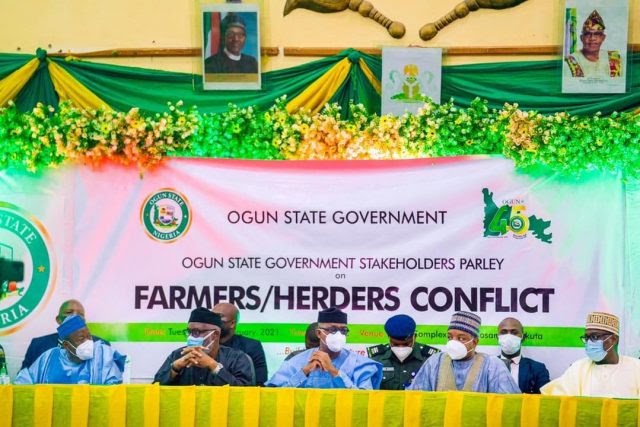Farmers-Herders Crisis: Northern Governors Meet In Southwest, Propose ‘Lasting Solution’

In a move to finding a lasting solution to incessant clashes between farmers and herders in Southwest, four governors from Northern Nigeria were in Ogun State on Tuesday to meet with their counterparts in the region, including traditional rulers, representatives of farmers and herders.
The Northern governors were Abdullahi Ganduje of Kano state, Abubakar Bagudu of Kebbi State; Abubakar Bello, Niger State and Bello Matawalle, Zamfara State.
The meeting was hosted by Dapo Abiodun, Governor of Ogun State in Abeokuta, the state capital.
It was also attended by Rotimi Akeredolu, Governor Ondo State governor who is also the Chairman of the Southwest Governors’ Forum.
Traditional leaders in Ogun State and representatives from Miyetti Allah Cattle Breeders Association of Nigeria, and those from the All Farmers Association of Nigeria
The governors unanimously agreed that the establishment of ranches would end the bloody clashes between farmers and herders.
HumAngle had reported that states in the Southwest, especially Ogun and Oyo, are characterised by clashes between farmers and herders, resulting in loss of lives and properties.
Meanwhile, the governors in Tuesday’s meeting blamed the clashes on open grazing of cattle by herders and called on the Federal Government to end the practice.
Abdullahi Ganduje, Governor of Kano State at the meeting reiterated his disapproval of open grazing while declaring that the clashes are “ECOWAS problems.”
He blamed the menace of bloody clashes between farmers and herders on population increase and the archaic method of pastoral rearing of cattle in Africa.
“In those days, when things were normal, the herdsmen, they used to come with thousands of cattle without any problem because the cattle routes right from Fratajalou in Mali across West African countries through Niger Republic through Benin,” Ganduje said.
“Our neighbours, coming into the Northern part of the country in Nigeria, the cattle routes were large enough to contain them, and that was why we could not have any problem in the past, but now, because of climate change, because of the population in Nigeria, because of increase of farmers in Nigeria, now the cattle routes are being encroached, and that is absolutely necessary so you can see that because of the climate change, the herdsmen from West Africa are coming into Nigeria.”
“They are not coming with the food for the cattle, they have to vet their food from the trees, and these trees are economic trees, and the owners of the economic trees will not allow them so problems will arise there, and also they will be branching into people’s farmland, the farmers cannot allow that, so what we are saying is that we have to take some drastic measures; otherwise we are just scratching the problem in the back.”
“We need to understand these issues, they are ECOWAS problems, as of now, they are ECOWAS problems, so through ECOWAS, there must be a means of either registering the cattle that are coming into Nigeria or preventing the movement of cattle into Nigeria, that is a fact because they come with weapons,” he added.
He said the herders are now using their weapons to attack farmers and to commit crimes.
Ganduje called for the stoppage of moving cattle from the north to the south and asked the federal government to help herders transit from pastoral to modern ranching.
He said the problem is an economic issue which is coloured by religious and ethnic sentiments.
“If we need peace with the farmers, but if we are led by sentiments, herdsmanship must change from traditional to commercial herdsmanship.”
“It must translate to commercial, not traditional, those days are gone, and I know some of the members of the Miyetti Allah may not be happy with my statement, but I have to make it, I’m a Fulani man like them.”
“It is economic issues that are turning into tribal issues; that are turning into religious issues. So if we spend the whole day talking about the tribal issues, and religious issues, that will not solve the problems.”
“That issue must be discussed, and it can only be discussed when we have adequate data.”
Meanwhile, Rotimi Akeredolu insisted that Southwest governors would not allow occupation of forest reserves by herdsmen.
Akeredolu told the herders that establishment of ranches as against pastoral herding of cattle has commercial gains.
He also reiterated the need to place a ban on open grazing, stressing that the practice would continue to create problems between farmers and the herders.
Akeredolu said the decision to flush out herders from forest reserves in the southwest was not targeted at any group, but an attempt to prevent insurgency in the region.
He called on the Miyetti Allah Cattle Breeders Association’s leadership to expose suspected criminals to maintain their good reputation.
The governors unanimously acknowledged the need to stop open grazing and check the influx of foreign herders into the country without proper identification and records.
Support Our Journalism
There are millions of ordinary people affected by conflict in Africa whose stories are missing in the mainstream media. HumAngle is determined to tell those challenging and under-reported stories, hoping that the people impacted by these conflicts will find the safety and security they deserve.
To ensure that we continue to provide public service coverage, we have a small favour to ask you. We want you to be part of our journalistic endeavour by contributing a token to us.
Your donation will further promote a robust, free, and independent media.
Donate HereStay Closer To The Stories That Matter




